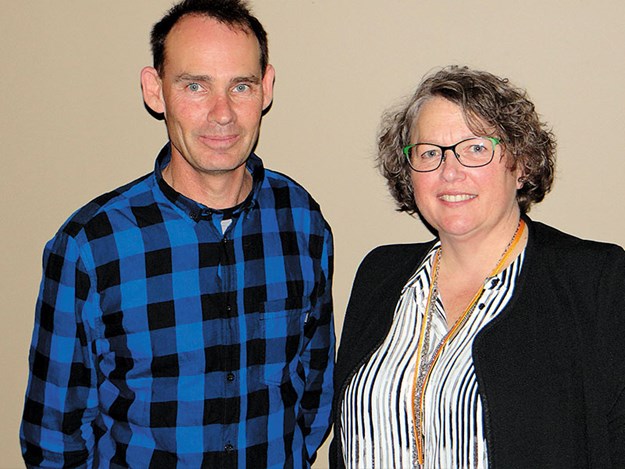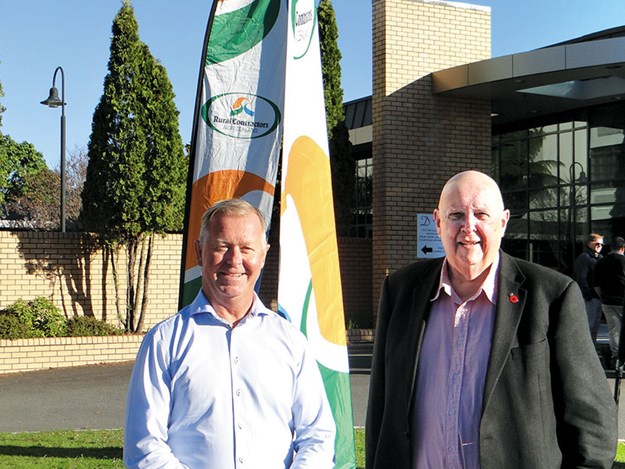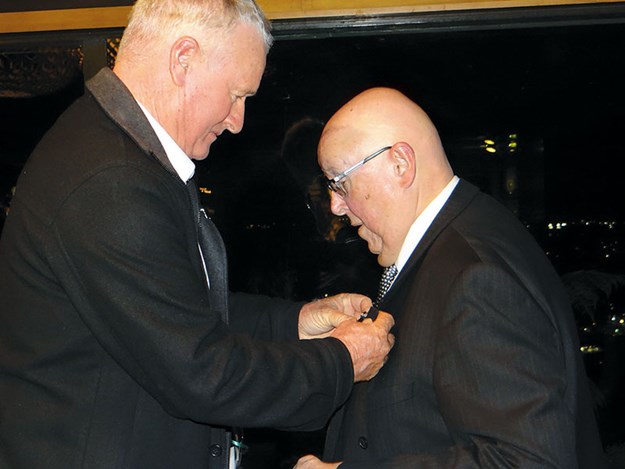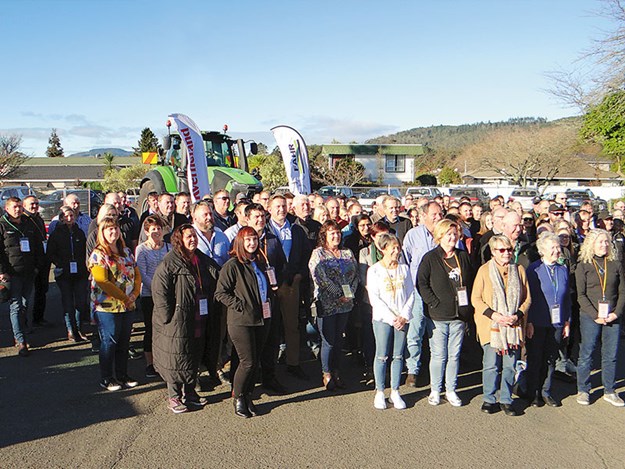RCNZ: New leadership as rural contractors face challenges
A new president, vice-president, and CEO have taken the helm at Rural Contractors NZ
Waikato contractor Helen Slattery stepped up from vice-president to replace Southland’s David Kean, and Wairarapa spray contractor Clinton Carroll became vice-president at the conference, held in Rotorua.
New CEO Andrew Olsen joins Rural Contractors NZ as its first full-time CEO, with the retirement of the long-serving Roger Parton.
Helen, the first woman to take the president’s role, says the conference reinforced the intense challenges rural contractors are facing, as well as identifying some new opportunities.
 |
|
Clinton Carroll and Helen Slattery
|
"I facilitated a Good Yarn workshop on the conference’s opening morning where we heard about some of the stresses our members are enduring, largely due to the ongoing shortage of skilled staff, particularly experienced machinery operators. We all work hard in the season, but these shortages are pushing some contractors to breaking point."
Helen says the key issue for rural contractors is the minimal allowance for 125 skilled machinery operators to come in for the next season when a survey of rural contractors showed 400 or more were needed to keep up with farmer demand.
"We accept that as a quid pro quo, we have to continue lifting our efforts to train more Kiwis. A new round of training is underway, including four month-long courses (with one to two more weeks of work experience) starting at the Telford campus from 12 July. Those trainees emerge with tractor-driving skills, but it takes our members a lot longer to get them to the point they can operate complex machinery."
Helen says the most fitting tribute to outgoing CEO Roger Parton was a charity auction he organised, which raised $50,000 for St John from donated goods, a result that left some of their staff in tears when announced.
"We are an industry with as big a heart as the challenges we face," says Helen.
New Rural Contractors CEO steps into the fray
 |
|
Andrew Olsen and Roger Parton
|
Andrew Olsen is no stranger to challenges. His previous CEO role was with the Travel Agents Association of New Zealand, which included helping negotiate a $50 million package from the Government to assist travellers caught out with paid travel bookings when COVID-19 struck.'
He brings nearly 20 years experience as a CEO or GM and four years as a director of Service IQ, the Industry Training Organisation for the service sector.
As the new CEO of Rural Contractors NZ, Andrew’s first focus is on the pressing labour shortages faced by his 600 members in the $1.5 billion-plus industry. He says economist Tony Alexander told the Rotorua conference of increasing labour shortages and competition for talent.
"His advice was for rural contractors to focus on their businesses and really consider their capacity to service customers, review pricing, and how to train and retain good workers. Many at the conference took this advice onboard immediately and began planning changes they will initiate."
This may include factoring in a string of messages that pricing of farm machinery and wrap film will rise next year by as much as 20% plus in some cases.
Andrew says rural contractors also heard that farmers are increasingly less interested in applying their own chemicals, opening up new customer opportunities for spray operators.
"I believe I’m coming into Rural Contractors NZ at a critical time for this important industry. Our industry is facing some significant challenges, particularly with labour shortages and the need to further boost our training."
One of Andrew’s first priorities in the job next month was dealing with the Government announcement that only 125 skilled agricultural machinery operators can come from overseas next season. RCNZ had requested a minimum of 400 after surveying its members.
"Being at our conference and talking to contractors gave some real insights into the pressures they are under. I immediately began engaging with Government officials and approaching ministers’ offices to put the case that 125 skilled machinery operators simply won’t cut the mustard. We mercifully got through the last season of labour and skills shortages because our members worked every hour God gave. That’s got much risk attached to allow it to become a model for the coming season."
Andrew attended the Primary Industries Summit in Christchurch in his first month in the job, only to discover there from enquiries he made that there may not be MIQ space available, even for the 125 approved skilled machinery operators, until November at the earliest.
"That’s just too late. The season gets underway two months earlier and given we’ve only got limited numbers coming in, we need them on the ground from the start. If not, crops will stay in the ground."
Andrew is now pursuing this issue with MPI and Immigration officials and seeking to meet ministers.
While he has not worked previously in the primary sector, Andrew lives a rural lifestyle in the Wairarapa so has some experience of engaging with local rural contractors.
Good Kean man bows out
 |
|
Roger gets his life membership badge from Steve Levet
|
After a dozen years on the Rural Contractors NZ Board and three years as president, Southland’s David Kean bowed out at the Rotorua conference on a reflective note.
He says when he became president, no one could have imagined a global pandemic that required the Board and rural contractors to implement a wholly different approach to how they did things.
David acknowledged the efforts of outgoing CEO Roger Parton, not least for securing approval for 210 skilled machinery operators to come into New Zealand for the 2020/21 season.
"We thought the days were over when our CEO spent about half his time working with members and officials on immigration issues. In fact, he has spent more time than ever trying to ensure he could wedge open the closed door and allow us to get as many skilled operators as was possible into the country."
The Government had made explicit that any imports were dependent on the industry showing it was providing training opportunities for any Kiwi who wanted to come into rural contracting.
"The stops were pulled out and members responded magnificently. Introductory days were held in places as small as Te Anau prior to taster courses and then six-week training courses at the Southern Institute of Technology campus at Telford near Balclutha. A number of contractors and machinery suppliers stepped up. I can’t acknowledge them all but special thanks to the ever-energetic John Hughes and to suppliers, including AgriCentre South, Southland Farm Machinery, JJ Ltd, HWR, and Tulloch Farm Machines."
David says some good recruits emerged as a result while making the point to the Government that no one can learn to drive a foraging machine in a few weeks.
The Telford training model was then picked up by the Taratahi campus in Wairarapa and as vice president, Helen worked with a private training establishment in Waikato, while another training model was developed in the region.
Meanwhile, RCNZ also continued its work to develop and support training for our sector. The New Zealand Certificate in Rural Contracting Level 3 was developed by ITO Connexis as a new ‘user-friendly’ qualification, eligible for free trades training.
David exhorted rural contractors to adopt the Level 3 certificate "because training is our best way to develop skills and keep staff through an emerging labour shortage crisis. Like it or not, the Government is making clear it will keep the migration doors all but closed."
 |
|
The team gathers for a photo
|
The Government’s ‘quota’ of 125 skilled machinery operators allowed here for 2021/22 season would not be enough. A survey earlier this year of members provided stark insights into the stresses created by the shortages of skilled labour.
"Contractor after contractor spoke of working horrendous hours, sometimes increased because supervisors had quit after having to oversee inexperienced staff made their own workload unbearable," says David.
"That feedback formed the basis of our response to the Government that we need at least 400 skilled machinery operators next season to avoid a slew of risks, including lower farm production and fatigue-driven health and safety incidents."
David says the task of getting across that message and others to the Government was key to appointing Andrew as the first full-time CEO for Rural Contractors NZ.
He paid tribute to Roger, CEO for the last 15 years – "a role that he has performed with loyalty and distinction" – before heading to a well-earned retirement in Levin with his wife Ronnie.
David says rural contracting faces a lot of challenges ahead – with labour shortages, expanding regulatory requirements, climate change to name just a few – but he believed with a new full-time CEO in place the organisation was well-placed to face the future.
Find new and used farm machinery for sale in NZ
Keep up to date in the industry by signing up to Farm Trader's free newsletter or liking us on Facebook



.jpg)




.jpg)
.jpg)
.jpg)

